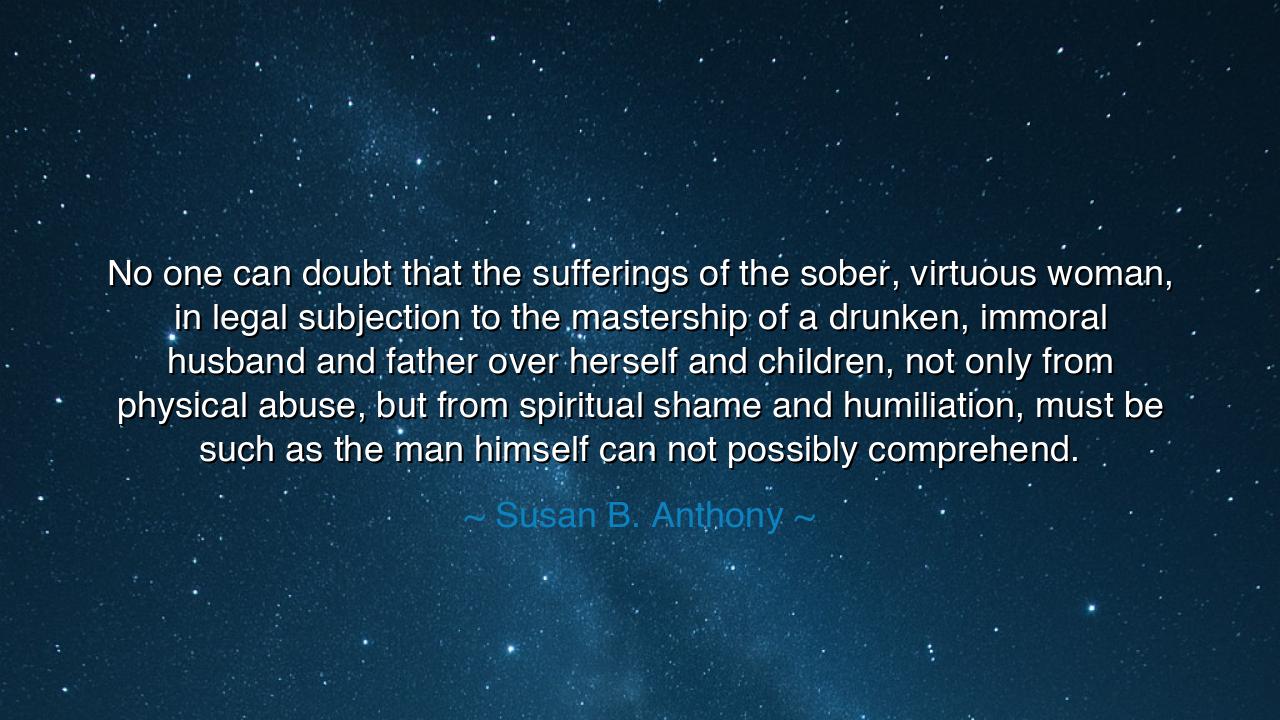
No one can doubt that the sufferings of the sober, virtuous
No one can doubt that the sufferings of the sober, virtuous woman, in legal subjection to the mastership of a drunken, immoral husband and father over herself and children, not only from physical abuse, but from spiritual shame and humiliation, must be such as the man himself can not possibly comprehend.






Hear the words of Susan B. Anthony, the indomitable voice of justice and truth: “No one can doubt that the sufferings of the sober, virtuous woman, in legal subjection to the mastership of a drunken, immoral husband and father over herself and children, not only from physical abuse, but from spiritual shame and humiliation, must be such as the man himself can not possibly comprehend.” These are not idle musings, but a cry born of the anguish of countless women whose lives were shackled by both unjust laws and cruel marriages. It is the voice of one who refused to remain silent in the face of oppression and who gave words to those whose pain was too often ignored.
The meaning of this quote lies in its piercing exposure of legal subjection. Anthony reminds us that it was not merely personal weakness or cruelty that bound women to abusive men, but the law itself—a system that gave the husband mastery over his wife, stripping her of independence, property, and even authority over her own children. Thus, the woman who lived with virtue and sobriety was forced to endure the humiliation of being ruled by one who embodied vice, and the state itself sanctioned this injustice. Anthony’s words strike at the heart of this hypocrisy, declaring that such suffering is beyond male comprehension, for the law never placed man in the same chains.
The origin of these words flows from the age in which Anthony lived, when women in America had no right to vote, limited rights to property, and little recourse in cases of domestic abuse. A wife was bound to her husband in near-total dependency, unable to escape without being cast into poverty or losing custody of her children. Anthony, as a leading voice of the women’s suffrage movement, spoke not only for political equality but for the liberation of women from the silent prisons of their homes. Her words were forged in the struggle to awaken the conscience of society to the hidden torments borne by its women.
History offers us countless examples of such injustice. Consider the plight of Caroline Norton in 19th-century England, a gifted writer trapped in a violent marriage. When she sought to leave, the law denied her property, earnings, and even access to her children. Her case became one of the sparks that led to reforms in British custody laws, yet only after years of humiliation and loss. Norton’s life, like that of so many women, illustrates the suffering Anthony described: physical wounds may heal, but the spiritual shame and humiliation inflicted by unjust laws leaves deeper scars.
The lesson is clear: laws that strip one group of dignity and hand unchecked power to another create not only inequality but unbearable suffering. Anthony’s words remind us that justice must not be partial—that the worth of the sober, virtuous woman is no less than that of any man, and her right to freedom, safety, and dignity must be defended. To ignore such truth is to allow tyranny within the very home, where love should reign, and to corrupt the very fabric of society.
What then must we do? We must ensure that our laws serve to protect, not to oppress. Defend the vulnerable against domination, whether in marriage, in family, or in society at large. Teach that equality is not a gift granted by the powerful, but a birthright of every soul. And when we see suffering born from unjust traditions, let us not turn away, but stand as Anthony stood—unyielding, courageous, and relentless in the pursuit of justice.
Thus, let Susan B. Anthony’s words echo as both warning and inspiration: the humiliation of the oppressed is invisible to those who rule them, unless truth is spoken with courage. Pass down this teaching to future generations: that the worth of women and men is equal before the law, that no spouse should live in subjection, and that every household should be built not upon mastership, but upon mutual respect, dignity, and love. For only in such balance can the home—and the nation—be truly just.






AAdministratorAdministrator
Welcome, honored guests. Please leave a comment, we will respond soon